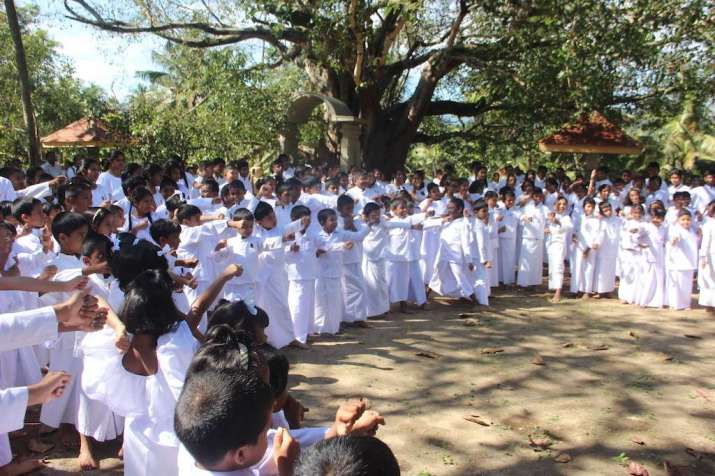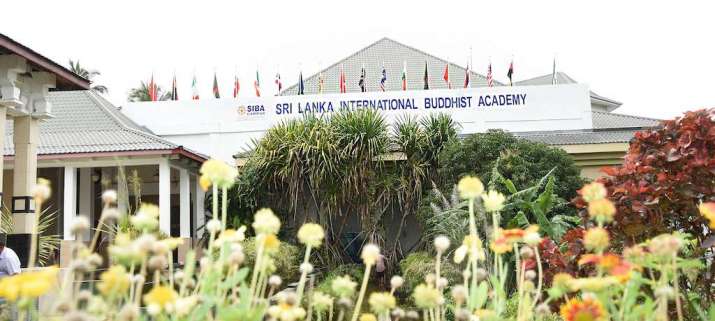
Established in February 2009 on a picturesque 27-acre stretch of land at Kundasale in Pallekele, eight kilometers from the city of Kandy, the Sri Lanka International Buddhist Academy (SIBA) provides education and promotes training for monastics and interested laypeople, regardless of religious background or ethnicity, in Sri Lanka and abroad. It is an ideal place for the academic pursuit of Buddhism in a quiet and peaceful environment, equipped with up-to-date facilities and staffed by qualified academics.
SIBA’s mission is based on the Buddhist principles of producing local, national, and international religious, social, and political leaders. Interwoven into this model of public service is the education and shaping of leaders into Dhamma practitioners and propagators. As it says on its website, SIBA aims “to be a leading International Buddhist University of Buddhist learning providing guidance to leadership based on the development of wisdom and inculcation of moral values.” On 28 March, thanks to its solid academic performance, SIBA was listed on the website of the Commonwealth Universities Yearbook, which is published by the Association of Commonwealth Universities.
SIBA initially began as an institute of higher education of the Temple of the Sacred Tooth Relic (also known as Sri Dalada Maligawa), one of the most famous Buddhist temples in Kandy. The basic objective was to award a degree in Buddhist leadership in affiliation with Thailand’s Mahachulalongkornrajavidyalaya University (MCU), alongside several other diplomas. Today, SIBA confers degrees such as postgraduate awards in Buddhist studies, a BA Special in Buddhist leadership, BA Special in Pali, BA general degree, BSc in information Technology and BTech (IT and Communication), and diplomas in Pali, Sanskrit, Buddhist counselling, Dhamma-Duta work, and Buddhism and social work. Sri Lankan students can study for a BA in Buddhist leadership tuition-free.
Dr. G. A. Somaratne, assistant professor of Buddhist studies at the University of Hong Kong’s (HKU) Centre of Buddhist Studies, served as rector of SIBA in 2010–12. He says SIBA’s main purpose is to educate lay and monastic students in Buddhist studies in English. Before SIBA, he noted, there were no institutions fully dedicated to teaching Buddhist studies programs in English to both monastics and the laity in Sri Lanka. The Hon. Pradeep Nialanga Dela, chief custodian of the Temple of the Sacred Tooth Relic then came up with the idea of establishing this new institution to do exactly that. In his proposal for the establishment of SIBA, Prof. Somaratne had conceptualized an institution where the fourfold sangha—monks, nuns, laymen, and laywomen—could not only gain knowledge of Buddhism in English but also develop leadership, communication, and language skills to serve the world while promoting Buddhist studies and propagating Buddhism.
Prof. Somaratne said that when designing SIBA he was inspired by renowned scholars and administrators in Sri Lanka and abroad, including those he met at Northwestern University in the US, Britain’s University of Oxford, Miyazaki International College in Japan, and the University of Peradeniya in Sri Lanka. With these inspirations and experiences, he designed SIBA as an institution with a progressive, cosmopolitan, and international spirit. He views Buddhism as a path of self-cultivation and realization that can be utilized for developing Buddhist leaders and educators to apply Buddhist insights and bring peace and prosperity to the world.

Ven. Chanda Sara, a Buddhist studies student at HKU, served as a visiting lecturer at SIBA and taught students from diverse countries including Myanmar, Nepal, and Vietnam. He described SIBA as a platform for Buddhist studies that helps students master languages such as Pali, Sanskrit, Sinhala, and English. He said that in many Buddhist-majority countries, Buddhist studies courses are taught in the local language. Students come from those countries to SIBA learn Buddhism in English, which is an excellent opportunity for them to broaden their outlook and get in touch with Buddhist studies trends abroad.
Dr. Upali M. Sedere, a well-known academic and educator in Sri Lanka, is serving as rector and CEO of SIBA. On 26 May, MCU awarded him with an honorary doctorate for his contributions to Buddhist management. He has developed SIBA in various capacities, including leadership qualities, meditation, and social work. During his tenure, 10 SIBA alumni received PhD degrees from MCU at two consecutive convocations. MCU also acknolwedged the innovations he introduced at SIBA to cultivate human values. He initiated a curriculum for all undergraduates, which included mandatory social service projects as well as meditation and yoga. All undergraduates also participate in monthly student counseling sessions for two hours.
Dr. Sedere also structured the undergraduate experience to be one in which students could learn skills alongside their main degree. Many SIBA graduates have obtained diplomas and higher diplomas in English, information tehcnology, and counseling psychology by the time they graduate, which no other university in Sri Lanka allows. More than 100 monastics from abroad have earned BAs and MAs here. In 2012, a research centre called SIBA-DCI (Dhammachai Institute) was established with generous support from Dhammchai Institute in Thailand. A branch of the Dhammachai Tipitaka Project, this center promotes research activities through a library that SIBA researchers, students, and staff can use. The main research activity is to contribute preparing a Tipitaka database of Sinhalese manuscripts to be used for editing the Pali Tipitaka. In addition, it translates the volumes of the Dhammachai Pali Tipitaka edition and the Pali commentaries into English and Sinhala. The translation is carried out by a group of Pali and Tipitaka scholars. The Sri Lanka International Journal of Buddhist Studies, an official academic journal of SIBA, is also published annually by SIBA’s research and publication unit.
SIBA also holds many activities such as the Carpe Diem 2019: Inter-School English Drama Festival and Competition, the Dhamma School Leadership Program, and the Drug Treatment and Rehabilitation Program for undergraduate students. SIBA is also running the Kandyan Dancing School, which is being constructed with funding from the government of India of around 150 million Sri Lankan rupees (US$848,000).
SIBA is one of the leading academic institutions for Buddhist studies in Sri Lanka. It has greatly contributed to the study of Buddhism and offers a well-rounded curriculum. SIBA students are now helping people around the world to understand more about Buddhism. Through these generous opportunities and facilities to study Buddhism (and apply the knowledge acquired), SIBA has helped people to realize for themselves the authenticity of Buddha’s teachings and how they can be applied to serve all sentient beings.
See more












